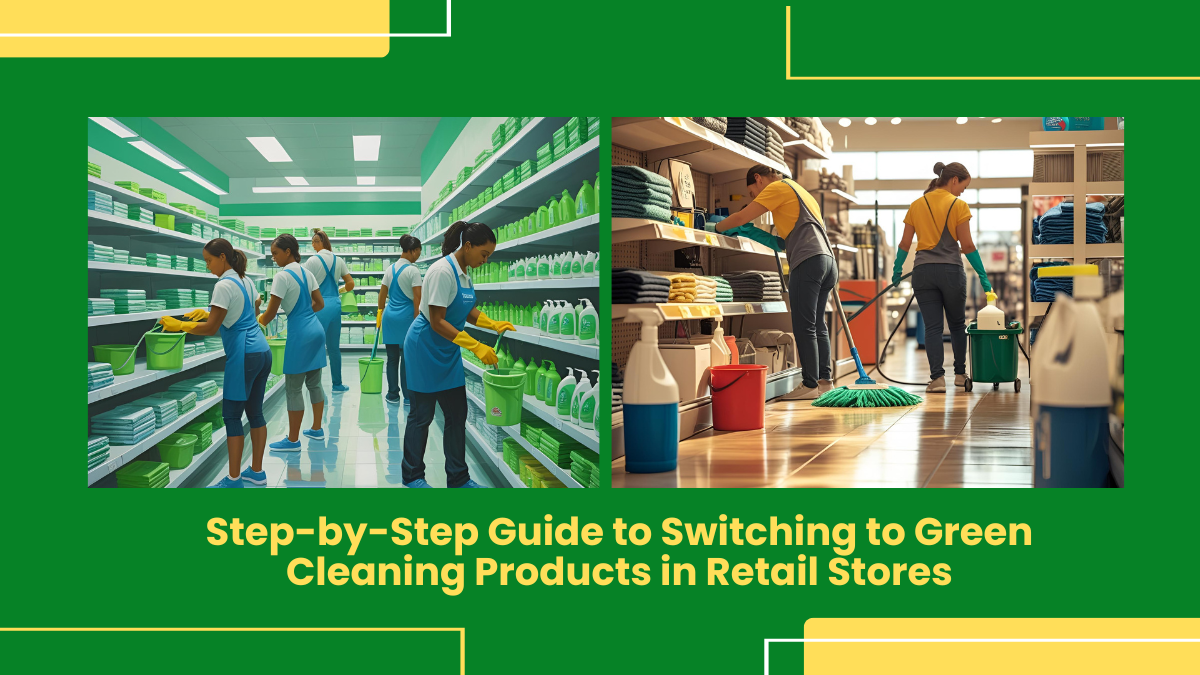Retail stores are high-traffic environments where hygiene directly affects customer perception, employee health, and brand image. Traditional cleaning products often contain harsh chemicals that pose risks to both people and the environment. The shift to green cleaning products is more than a trend—it’s a practical move for better safety, lower costs, and long-term compliance.
This guide walks you through common challenges, step-by-step solutions, and useful prevention tips to successfully make the switch.
Common Problems with Conventional Cleaning Products in Retail
1. Health and Safety Risks
Many conventional cleaners contain ingredients like chlorine, ammonia, and volatile organic compounds (VOCs). These can:
- Irritate skin, eyes, and lungs
- Trigger allergies or asthma
- Create slippery surfaces and chemical exposure zones
2. Poor Customer Perception
Customers are more conscious of what they see—and smell—in your store. Strong chemical odors or residue can:
- Lead to complaints
- Diminish brand trust
- Drive foot traffic away, especially in wellness or food-related retail spaces
3. Compliance and Waste Disposal Issues
Hazardous cleaners require:
- Special storage and labeling
- Waste treatment protocols
- Compliance with local environmental laws
These increase operational complexity and raise the risk of penalties or audits.
4. High Product and Usage Costs
Traditional products often need:
- Frequent reapplication
- Dilution stations
- Separate products for different surfaces (glass, floor, counters, etc.)
This results in higher usage and inventory management costs.
Solution: A Step-by-Step Guide to Transitioning to Green Cleaning Products
Step 1: Conduct a Product Audit
Start by listing all cleaning products currently used in your retail store, including:
- Brand names
- Purpose (e.g., floor, restroom, glass)
- Frequency of use
- Cost per unit
- Safety or compliance issues reported
This baseline helps you identify which cleaners can be replaced immediately and which ones need alternatives.
Step 2: Define Store-Specific Needs
Each retail store has unique surfaces, customer traffic, and health protocols. Consider:
- Flooring types (tiles, concrete, carpet)
- Number of public restrooms
- Food sections or open sampling areas
- HVAC and ventilation systems (affects cleaner residue and odor)
Understanding this helps in selecting the right green cleaning products tailored to your store.
Eco-Green Flo For Floor Cleaning
Eco-Green Flo is a cleaning solution made with extrinsic research from researchers at Ecochem. With our inclination towards bio-based cleaning products, this natural concentrate has strong abilities to sanitize any type of floors gently and adds a mirror shine to the surfaces. With single usage, the solution cleanses ceramic walls, floor tiles, lacquered surfaces, marble floors, marble surfaces, ceramic walls in minutes.
Step 3: Choose Certified Green Products
Look for cleaners with credible eco-certifications such as:
- Green Seal
- EcoLogo
- USDA Certified Biobased
Check the following:
- Ingredient transparency
- Biodegradability
- VOC levels
- Safe-for-use labels (pets, food areas, children)
Ecochem offers a range of certified products suitable for high-traffic retail environments, from biodegradable floor cleaners to plant-based disinfectants.
Step 4: Run a Trial Phase
Before replacing all products at once, test green alternatives in one area of the store, such as:
- Breakrooms
- Front entry glass and floor
- Restrooms
Track:
- Cleaning effectiveness
- Staff feedback
- Customer complaints or compliments
This phase builds internal trust and gives measurable data for future rollout.
Step 5: Train Cleaning Staff
Train janitorial staff and in-house teams on:
- Proper dilution (if needed)
- Contact time for surface cleaners
- Safety measures for natural ingredients
Ecochem’s platform can support training using digital signage, displaying step-by-step cleaning videos, checklists, and safety tips across screens in storage or backroom areas.
Step 6: Implement Store-Wide Rollout
Once tested, roll out green cleaning products across:
- All floors
- Glass panels
- Counters and checkout areas
- Customer restrooms
- Storage and inventory rooms
Create a checklist for consistency and assign monitoring responsibility to a store manager or maintenance lead.
Eco-Green All (Glass Cleaner)
Glasses are meant to shine and gloss, researchers at Ecochem offers all types of glass cleansing and care solutions with handy Green-All Glass Cleanser. It leaves surfaces shiny and acts softly on scratches leaving the glass and stainless steel polished and stain-free as it is formulated using water-based techniques. Our biodegradable chemicals for cleaning provides the best solutions to the surface by disinfecting them of microbes and bacteria.
Step 7: Use Digital Signage for Awareness
Leverage in-store digital signage to:
- Share cleaning practices with customers
- Display eco-certifications for transparency
- Promote store hygiene as a branding strategy
With Ecochem’s signage platform, connect over 100 apps to schedule, display, and update cleaning content in real-time.
Prevention Tips: Ensuring Long-Term Success with Green Cleaning
Switching to green cleaning is just the start. Keep your system running smoothly with these prevention tips:
✅ Standardize Product Usage
Avoid mixing multiple brands. Stick to a consistent set of green cleaning products to reduce confusion and training time.
✅ Store Products Safely
Even eco-friendly products need proper storage. Keep away from food stock, direct sunlight, and high-traffic areas.
✅ Monitor Results Monthly
Track cleanliness, supply usage, and staff compliance. Review monthly reports to identify issues early.
✅ Involve Your Staff
Encourage team input on new products. Cleaner feedback from the ground level often identifies gaps faster than upper management.
✅ Stay Compliant
Even green products must meet retail health regulations. Keep Safety Data Sheets (SDS) accessible and up-to-date.
Why Retail Stores Choose Ecochem
Ecochem makes switching simple. Our range of green cleaning products is designed for high-traffic retail settings and includes:
- Surface and floor cleaners
- Restroom and glass cleaning solutions
- Degreasers and disinfectants
Each product is:
- Biodegradable
- VOC-free
- Skin-safe and food-safe where applicable
Plus, our digital signage platform gives you:
- 100+ app integrations
- Custom display scheduling
- Staff training screens
- Real-time content updates for cleaning reminders and safety instructions
Whether you run a single store or a retail chain, Ecochem’s combined product and signage system helps you maintain hygiene, stay compliant, and present a greener brand image to your customers.
Conclusion
Switching to green cleaning products in retail stores isn’t just about environmental responsibility—it’s a smart business decision. It improves in-store air quality, protects your staff and customers, lowers long-term costs, and strengthens your brand’s reputation.
By following a structured approach—auditing your current cleaners, choosing certified alternatives, training staff, and using tools like digital signage for communication—you can transition smoothly without disrupting daily operations.
Ecochem makes this process easier with safe, effective cleaners and an integrated signage platform to support communication, training, and compliance. Make the switch today—and keep your retail space clean, safe, and sustainable.
FAQ’S
What are green cleaning products?
Eco-friendly cleaners made from biodegradable, non-toxic ingredients safe for people, surfaces, and the environment.
Why switch to green cleaning in retail?
Improves safety, lowers chemical exposure, supports sustainability, and builds customer trust in your store’s hygiene practices.
Are green cleaners as effective as chemical ones?
Yes, quality green products clean thoroughly without harmful residues or strong odors.
Do green products cost more?
Not always—long-term savings come from reduced health risks, less product use, and simplified compliance.
Can I use green cleaners on all surfaces?
Most are versatile, but always check labels for compatibility with sensitive materials like wood or electronics.
Written By: Vinny Jain


